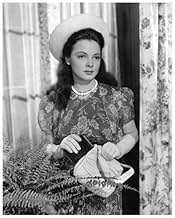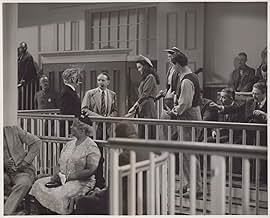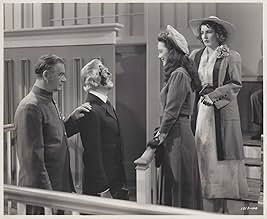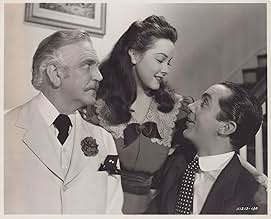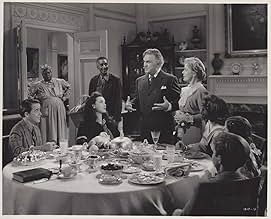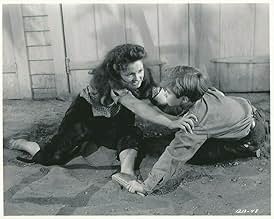Füge eine Handlung in deiner Sprache hinzuBiography of Robert Yancey, long-term district attorney in Lynchburg, Virginia.Biography of Robert Yancey, long-term district attorney in Lynchburg, Virginia.Biography of Robert Yancey, long-term district attorney in Lynchburg, Virginia.
- Regie
- Drehbuch
- Hauptbesetzung
Johnny Mitchell
- Jim Shirley
- (as Douglass Newland)
Erville Alderson
- Judge Fred Stuart
- (Nicht genannt)
Myrtle Anderson
- Yancey's 1929 Second Maid
- (Nicht genannt)
Hooper Atchley
- Juror
- (Nicht genannt)
Empfohlene Bewertungen
"This is the story of a vanishing era when simple men so loved their country, their families that America became a better place to live." The setting is 1913 Lynchburg, Virginia. There, popular prosecuting attorney Frank Morgan (as Robert "Cap'n Bob" Yancey) resides with his large family. Likewise "old-fashioned" wife Spring Byington (as Rosa) is the mother. The couple have five children, led by high-pitched Kathryn Grayson (as Rebecca) and lawyer-like Natalie Thompson (as Margaret). The "girls" are ready to choose mates and careers, which gets to the film's intended sub-textual theme - the changing role of women in the 20th century...
There is a story here, but not the one you're expecting...
The possibility one of the daughters may become an attorney is addressed, although marrying a lawyer is preferable. Women do drive motor vehicles, without hysterics (transportation brackets the decades spanning film artfully); most significantly, a minor female character is portrayed as a relatively positive divorcée. Now contrast the "hints" of freedom permitted women with those afforded ex-slaves and you've got a more interesting film. Beloved family retainers "Aunt" Louise Beavers (as Emmeline) and "Uncle" Leigh Whipper (as Josh) know their place is happily slaving away their lives away for the white master. It's insightfully racist.
****** The Vanishing Virginian (1/23/42) Frank Borzage ~ Frank Morgan, Spring Byington, Kathryn Grayson, Louise Beavers
There is a story here, but not the one you're expecting...
The possibility one of the daughters may become an attorney is addressed, although marrying a lawyer is preferable. Women do drive motor vehicles, without hysterics (transportation brackets the decades spanning film artfully); most significantly, a minor female character is portrayed as a relatively positive divorcée. Now contrast the "hints" of freedom permitted women with those afforded ex-slaves and you've got a more interesting film. Beloved family retainers "Aunt" Louise Beavers (as Emmeline) and "Uncle" Leigh Whipper (as Josh) know their place is happily slaving away their lives away for the white master. It's insightfully racist.
****** The Vanishing Virginian (1/23/42) Frank Borzage ~ Frank Morgan, Spring Byington, Kathryn Grayson, Louise Beavers
Others here have very ably and fondly described the movie's storyline, characters, and acting; however, there has not been attention paid to the music in this film, especially to Kathryn Grayson's talents
Miss Grayson's talents are well displayed, both as a singer and as an actress, and her amazing voice is put to good use here without seeming overly contrived, even to modern ears; the songs were appropriate to the scene, such as when Miss Grayson's character was entertaining two little girls by singing to them playfully, or when an impromptu ensemble joined on the home's front porch one evening, singing and laughing, which was not at all unusual in the days before air conditioning, televisions, and computers.
Individually and in ensembles, many of the cast contributed their vocal and instrumental talents, with two moments standing out as particularly touching: the congregation singing at the funeral (with Miss Grayson having a prominent role), and the town's men singing a heartfelt "Auld Lang Syne" at the film's closing scene.
No, this is not a musical, but like many films of that era and of this genre, there is music in it. It is not music that is merely incidental or music that underscores on-screen action, but music integral to the story and which is itself part of the dialogue -- part of the story.
"The Vanishing Virginian" is a gentle reminder of how the masters of a bygone era told their stories. Sometimes it seems we are missing a lot in more modern movies.
Miss Grayson's talents are well displayed, both as a singer and as an actress, and her amazing voice is put to good use here without seeming overly contrived, even to modern ears; the songs were appropriate to the scene, such as when Miss Grayson's character was entertaining two little girls by singing to them playfully, or when an impromptu ensemble joined on the home's front porch one evening, singing and laughing, which was not at all unusual in the days before air conditioning, televisions, and computers.
Individually and in ensembles, many of the cast contributed their vocal and instrumental talents, with two moments standing out as particularly touching: the congregation singing at the funeral (with Miss Grayson having a prominent role), and the town's men singing a heartfelt "Auld Lang Syne" at the film's closing scene.
No, this is not a musical, but like many films of that era and of this genre, there is music in it. It is not music that is merely incidental or music that underscores on-screen action, but music integral to the story and which is itself part of the dialogue -- part of the story.
"The Vanishing Virginian" is a gentle reminder of how the masters of a bygone era told their stories. Sometimes it seems we are missing a lot in more modern movies.
10Baronevl
A must see for all those movie lovers of good old time movies that have wonderful family values to portray and done in such a excellent manner. They don't make movies like this anymore which is very sad. An excellent performance by Frank Morgan and all the supporting cast. A young Kathryn Grayson plays a delightful role too. If you like the old time family values portrayed then this is a definite must.
It's 1913 in Virginia. Six term Prosecuting Attorney of Lynchburg, Robert Yancey (Frank Morgan), intends to run for a seventh term despite his wife's objection. They have five children and plenty of black servants who are treated as family.
This movie is pushing very hard for the nostalgia of the old south. It is interesting for this era of cinema and as a study of the old societal conventions. It's based on the memoirs from one of Robert's children. None of this has lasted long in the popular imagination. It's trying to show a life of racial justice, but the paternal attitude overwhelms the works. It doesn't help with the dated comedy from the accidental black-face. It's a different time. The family story is rather scattered. It's a lot of rambling happenings without structure. It's a time and a place, not only for this story but when this was released.
This movie is pushing very hard for the nostalgia of the old south. It is interesting for this era of cinema and as a study of the old societal conventions. It's based on the memoirs from one of Robert's children. None of this has lasted long in the popular imagination. It's trying to show a life of racial justice, but the paternal attitude overwhelms the works. It doesn't help with the dated comedy from the accidental black-face. It's a different time. The family story is rather scattered. It's a lot of rambling happenings without structure. It's a time and a place, not only for this story but when this was released.
This is a warm, humorous and sentimental film, based on Rebecca Yancy Williams' memoir of her family in small-town Virginia, circa 1905-1929. The essence of the story is centered on her father, Colonel Bob, and his life long public service. The film also lightly and humorously delves into the issues of the time, i.e. prohibition and women's suffrage. What makes this film a winner for me, is the fine acting of Frank Morgan as Colonel Robert Yancy, and Spring Byington as his wife. Well directed by Frank Borzage, and with MGM topnotch production values, it's worth a look, if sentimental films appeal to you.
Wusstest du schon
- WissenswertesThe character of "Marcia Marshall" is loosely based on Nancy Astor, who returned for a visit to Virginia in the 1920s after becoming the first woman member of the House of Commons.
- VerbindungenReferenced in Schatten am Fenster (1942)
- SoundtracksThe British Grenadiers
(uncredited)
Music: 18th century or earlier
Lyrics anonymous
Parts are in the score during the opening credits and for the first scene
Sung in part a cappella by Frank Morgan twice
Top-Auswahl
Melde dich zum Bewerten an und greife auf die Watchlist für personalisierte Empfehlungen zu.
Details
- Erscheinungsdatum
- Herkunftsland
- Sprache
- Auch bekannt als
- Mr. Yancey of Virginia
- Drehorte
- Produktionsfirma
- Weitere beteiligte Unternehmen bei IMDbPro anzeigen
Box Office
- Budget
- 499.000 $ (geschätzt)
- Laufzeit
- 1 Std. 37 Min.(97 min)
- Farbe
- Seitenverhältnis
- 1.37 : 1
Zu dieser Seite beitragen
Bearbeitung vorschlagen oder fehlenden Inhalt hinzufügen

